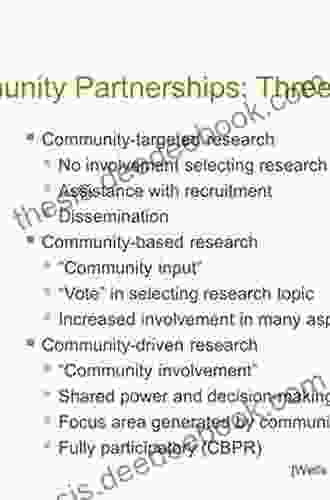Community Based Participatory Research: A Collaborative Approach to Addressing Health Disparities

Community-Based Participatory Research (CBPR) is a collaborative research approach that involves community members, researchers, and other stakeholders in all aspects of the research process. CBPR is based on the principles of community engagement, empowerment, and social justice. It aims to address health disparities faced by underserved communities and to create sustainable solutions that improve health outcomes.
CBPR is guided by several key principles:
- Community Engagement: CBPR actively involves community members in all aspects of the research process, from planning and design to implementation and evaluation.
- Empowerment: CBPR empowers community members to identify and address their health concerns and to develop solutions that meet their needs.
- Social Justice: CBPR seeks to address the underlying social and economic factors that contribute to health disparities.
- Collaboration: CBPR is a collaborative process that involves researchers, community members, and other stakeholders working together as partners.
- Sustainability: CBPR aims to create sustainable solutions that can be maintained over time.
CBPR offers several benefits over traditional research approaches:
5 out of 5
| Language | : | English |
| File size | : | 1206 KB |
| Text-to-Speech | : | Enabled |
| Screen Reader | : | Supported |
| Enhanced typesetting | : | Enabled |
| Print length | : | 266 pages |
- Increased Relevance: CBPR research is grounded in the needs and perspectives of the community, ensuring that the research is relevant and meaningful to the people it aims to serve.
- Enhanced Trust: Collaborative partnerships between researchers and community members build trust, which facilitates data collection and implementation of research findings.
- Increased Impact: CBPR solutions are more likely to be accepted and implemented by the community, resulting in greater impact on health outcomes.
- Community Empowerment: CBPR empowers community members to take ownership of their health and to advocate for their needs.
- Increased Sustainability: Solutions developed through CBPR are more likely to be sustainable over time, as they are based on community-driven priorities.
CBPR has been successfully applied in various research projects, including:
- Addressing Obesity in Native American Communities: A CBPR project in the Navajo Nation successfully implemented a community-based weight loss program that resulted in significant weight loss and improvements in cardiovascular health.
- Reducing HIV/AIDS Transmission in African American Women: A CBPR project in Atlanta developed and implemented a culturally tailored HIV prevention program that led to a decrease in HIV incidence among African American women.
- Improving Diabetes Management in Hispanic Communities: A CBPR project in South Texas created a community-based diabetes management program that improved blood sugar control and reduced diabetes-related complications.
Conducting CBPR involves several key steps:
- Building Partnerships: Establish partnerships with community organizations, health providers, and other stakeholders.
- Community Engagement: Engage community members in all aspects of the research process, including planning, data collection, and analysis.
- Data Collection: Collect data from community members using a variety of methods, such as surveys, interviews, and focus groups.
- Analysis and Interpretation: Analyze the data using both qualitative and quantitative methods to identify patterns and trends.
- Action Planning: Develop action plans based on the research findings, in collaboration with community members.
- Implementation and Evaluation: Implement the action plans and evaluate their impact on health outcomes and community engagement.
Community-Based Participatory Research is a powerful tool for addressing health disparities and improving the health of underserved communities. By actively involving community members in all aspects of the research process, CBPR empowers communities, enhances trust, increases impact, and promotes sustainability. As a result, CBPR contributes to the creation of healthier, more equitable communities.
- Centers for Disease Control and Prevention: Community-Based Participatory Research
- National Institute of Health: Community-Based Participatory Research
- University of Washington: Center for Community-Based Research
5 out of 5
| Language | : | English |
| File size | : | 1206 KB |
| Text-to-Speech | : | Enabled |
| Screen Reader | : | Supported |
| Enhanced typesetting | : | Enabled |
| Print length | : | 266 pages |
Do you want to contribute by writing guest posts on this blog?
Please contact us and send us a resume of previous articles that you have written.
 Book
Book Novel
Novel Page
Page Chapter
Chapter Text
Text Reader
Reader Library
Library E-book
E-book Magazine
Magazine Newspaper
Newspaper Sentence
Sentence Bookmark
Bookmark Glossary
Glossary Bibliography
Bibliography Foreword
Foreword Preface
Preface Synopsis
Synopsis Annotation
Annotation Manuscript
Manuscript Scroll
Scroll Codex
Codex Bestseller
Bestseller Encyclopedia
Encyclopedia Dictionary
Dictionary Card Catalog
Card Catalog Borrowing
Borrowing Archives
Archives Periodicals
Periodicals Study
Study Scholarly
Scholarly Reserve
Reserve Reading Room
Reading Room Rare Books
Rare Books Special Collections
Special Collections Interlibrary
Interlibrary Thesis
Thesis Storytelling
Storytelling Awards
Awards Theory
Theory Textbooks
Textbooks Herbert Jones
Herbert Jones Jason Rohan
Jason Rohan Jason Stein
Jason Stein A C Stranger
A C Stranger Michelle Knight
Michelle Knight A C Davison
A C Davison 7th Edition Kindle Edition
7th Edition Kindle Edition Loretta Graziano Breuning
Loretta Graziano Breuning Thee Tasha Marie
Thee Tasha Marie Eric Z Anderson
Eric Z Anderson David Ohle
David Ohle Philippe Espinasse
Philippe Espinasse Sarah Mae
Sarah Mae Donya Quick
Donya Quick Kristen Proby
Kristen Proby Frank Absher
Frank Absher Robert Miklitsch
Robert Miklitsch Teresa Maria O Hara
Teresa Maria O Hara Alina Owais
Alina Owais Danielle Bruckert
Danielle Bruckert
Light bulbAdvertise smarter! Our strategic ad space ensures maximum exposure. Reserve your spot today!
 Levi PowellFollow ·3.5k
Levi PowellFollow ·3.5k Amir SimmonsFollow ·17k
Amir SimmonsFollow ·17k Jared PowellFollow ·7.8k
Jared PowellFollow ·7.8k Joseph FosterFollow ·18.5k
Joseph FosterFollow ·18.5k Alec HayesFollow ·13.9k
Alec HayesFollow ·13.9k Stuart BlairFollow ·3.4k
Stuart BlairFollow ·3.4k Matthew WardFollow ·11.4k
Matthew WardFollow ·11.4k Ike BellFollow ·15k
Ike BellFollow ·15k

 Russell Mitchell
Russell MitchellGCSE Set Text Student Edition: Collins Classroom Classics...
The GCSE Set Text Student Edition: Collins...

 Ralph Turner
Ralph TurnerSix Sigma Lean Green Belt Training for Beginners with...
What is Six...

 Travis Foster
Travis Foster10 Life-Changing Lessons I Learned When I Was Single
Being single can...

 Jermaine Powell
Jermaine PowellOne Great Insight Is Worth a Thousand Good Ideas
In the competitive and...
5 out of 5
| Language | : | English |
| File size | : | 1206 KB |
| Text-to-Speech | : | Enabled |
| Screen Reader | : | Supported |
| Enhanced typesetting | : | Enabled |
| Print length | : | 266 pages |
















